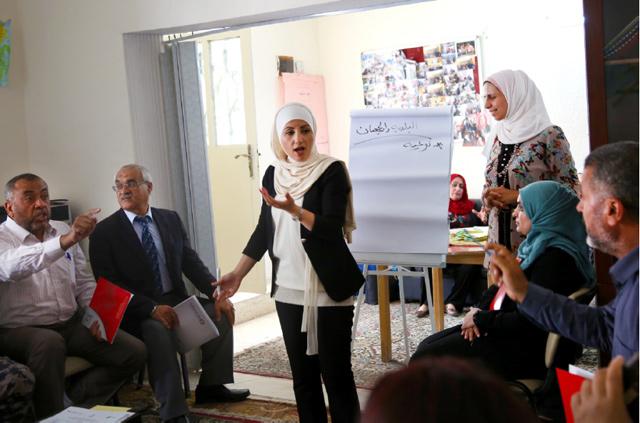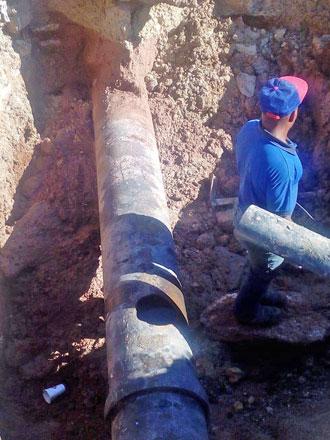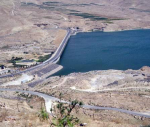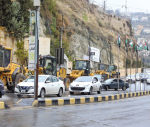You are here
Salt citizens get water running in community
By Camille Dupire - Mar 15,2018 - Last updated at Mar 15,2018

Members of the water community group meet in Allan, Salt, recently (Photo courtesy, Oxfam / Alixandra Buck)
AMMAN — A group of 12 men and women from the town of Allan in Salt have joined forces to try and improve the water situation in their governorate, along with government officials at the Water Authority of Jordan (WAJ).
Abir Suleiman Mrooj, Buthaina Al Zubi, and Majde Algharagher are three of the members of this water community group, formed as part of the AWANE (Addressing Water Needs of Jordanian Host Communities) project implemented by Oxfam, Future Pioneers for Empowering Communities, the Ministry of Water and Irrigation and the WAJ.
A nation-wide resource problem
Since the launch of the initiative, Abir Suleiman Mrooj, a housewife and newfound "water ambassador", has become a leader in her community.
“The sight of wasted water all over the streets used to hurt us, as we were working so hard to save water in our homes... So, at first, we were like a beehive around Mr Algharagher [an official at the WAJ in Salt] — always pushing until we got a solution to each issue," she recalled.
Ranked as the fourth most water-scarce country in the world by the World Resource Institute, Jordan suffers from an extremely high discrepancy in the water consumption-replacement ratio.
"Water use far exceeds the replacement rate, and leaks, breakages and interrupted water supply are all too common — pointing to the need for systemic changes to water infrastructure, water governance and water use patterns," a statement by Oxfam Jordan said.
Director of Salt District for WAJ Majde Algharagher recognised the extent of the issue, especially in the northern governorates. “There has been a huge increase in population in Jordan, so there is less water available per person,” he said, adding “we are also seeing illegal pumping, which is making water even scarcer."
According to data published by USAID, over 40 per cent of water in Jordan’s network is lost through leakages and other losses.
The efforts of a grassroots initiative
In light of the insufficient water supply to their area, Allan's citizens, including Mrooj and Al Zubi, raised their concerns to Algharagher, who was in turn able to convince the Water Authority to respond with extensive improvements to the local water network, valued at over JD150,000.
“Through this project we, housewives, were able to achieve something for our community. The Water Authority heard my voice, and, through me, the voices of many people in Jordan. We feel so proud that we could impact our community and the government," Mrooj said.
Since then, leakages in Allan have dropped significantly, while additional improvements are expected to further reduce the losses, according to locals.
Citizen/government coordination
The changes were made possible thanks to the high level of coordination between the community members and the WAJ officials, who were directly informed and updated on the citizens' grievances and water related needs.
Collaborating with the community has made it easier for the Water Authority to find and stop water losses, according to Algharagher, who said “now that I am in the water group, people can contact me directly by phone. Before, they had to come to the office or call the ministry and it would be a long process to speak to me. We also have a Whatsapp group, so they can send me a picture of a broken pipe or any problem, and I can respond. I can immediately send maintenance staff, and they can fix it. The response is easier and faster than before.”
In Jordan, it is still uncommon for government and citizens to talk face to face on issues of common concern, an official at Oxfam said, citing a recent Chatham House report which showed that Jordanians remain "highly skeptical" on the role of civil society in producing effective change.
"The emergence of new, local grassroots civil society organisations is changing how Jordanians conceive of civil society. Building on the perception that the traditional model of civil society in Jordan is flawed, alternative forms of activism are developing, largely unnoticed by a donor community still focused on large-scale formal NGOs," the report stated.
Despite such encouraging achievements, things are still not perfect, explained Mrooj, who said “now, my water is good. But honestly, I know other places still struggle.”
The AWANE project is implemented with the support of the Canadian government through Global Affairs Canada.
Related Articles
AMMAN — A four-year long project aimed at addressing host communities’ water needs across the country on Wednesday held a concluding ceremon
The Water Authority of Jordan (WAJ) and Oxfam on Thursday signed an agreement to provide equipment to Balqa Water Directorate.
AMMAN — A two-decade old carrier that supplies most of Salt city in Balqa Governorate with water exploded on Monday, causing limited physica
















